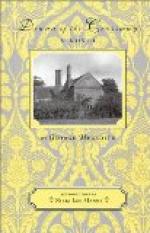Perry Wilkinson is not so elaborate: he describes her in his ‘Recollections’ as a splendid brune, eclipsing all the blondes coming near her: and ‘what is more, the beautiful creature can talk.’ He wondered, for she was young, new to society. Subsequently he is rather ashamed of his wonderment, and accounts for it by ’not having known she was Irish.’ She ‘turns out to be Dan Merion’s daughter.’
We may assume that he would have heard if she had any whiff of a brogue. Her sounding of the letter R a trifle scrupulously is noticed by Lady Pennon: ’And last, not least, the lovely Mrs. Warwick, twenty minutes behind the dinner-hour, and r-r-really fearing she was late.’
After alluding to the soft influence of her beauty and ingenuousness on the vexed hostess, the kindly old marchioness adds, that it was no wonder she was late, ’for just before starting from home she had broken loose from her husband for good, and she entered the room absolutely houseless!’ She was not the less ‘astonishingly brilliant.’ Her observations were often ‘so unexpectedly droll I laughed till I cried.’ Lady Pennon became in consequence one of the stanch supporters of Mrs. Warwick.
Others were not so easily won. Perry Wilkinson holds a balance when it goes beyond a question of her wit and beauty. Henry Wilmers puts the case aside, and takes her as he finds her. His cousin, the clever and cynical Dorset Wilmers, whose method of conveying his opinions without stating them was famous, repeats on two occasions when her name appears in his pages, ‘handsome, lively, witty’; and the stressed repetition of calculated brevity while a fiery scandal was abroad concerning the lady, implies weighty substance—the reservation of a constable’s truncheon, that could legally have knocked her character down to the pavement. We have not to ask what he judged. But Dorset Wilmers was a political opponent of the eminent Peer who yields the second name to the scandal, and politics in his day flushed the conceptions of men. His short references to ‘that Warwick-Dannisburgh affair’ are not verbally malicious. He gets wind of the terms of Lord Dannisburgh’s will and testament, noting them without comment. The oddness of the instrument in one respect may have served his turn; we have no grounds for thinking him malignant. The death of his enemy closes his allusions to Mrs. Warwick. He was growing ancient, and gout narrowed the circle he whirled in. Had he known this ‘handsome, lively, witty’ apparition




